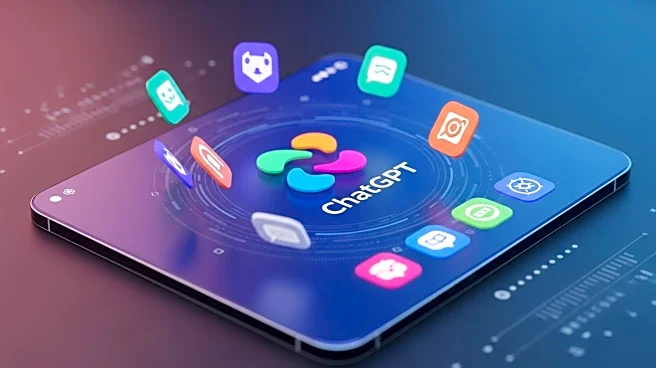What's Happening?
OpenAI has launched a new feature allowing developers to build applications within ChatGPT, enabling users to access interactive apps from companies like Booking.com, Expedia, and Spotify directly through the chatbot. This development was announced at OpenAI's DevDay 2025, where CEO Sam Altman emphasized the goal of making ChatGPT a tool for productivity and learning. The new system uses the Model Context Protocol (MCP) to connect data sources to AI systems, allowing apps to trigger actions and render interactive UIs. This integration aims to create a richer user experience by allowing seamless interaction with third-party tools.
Why It's Important?
The introduction of apps within ChatGPT represents a significant step in the evolution of AI-driven platforms, potentially transforming how users interact with digital services. By integrating apps directly into ChatGPT, OpenAI is creating a more cohesive ecosystem that could enhance user productivity and engagement. This move also provides developers with a new distribution channel for their applications, potentially leading to increased innovation and competition in the app development space. However, it raises questions about data privacy and the extent of access third-party developers will have to user interactions.
What's Next?
As OpenAI continues to expand the range of apps available within ChatGPT, there will likely be ongoing discussions about privacy and data security. Developers will need to adhere to guidelines on data collection and transparency, and OpenAI may introduce monetization options for apps. The success of this initiative will depend on user adoption and the ability of developers to create valuable and engaging applications. Additionally, OpenAI's approach to prioritizing user experience over commercial interests will be closely watched by industry stakeholders.
Beyond the Headlines
The integration of apps within ChatGPT could have broader implications for the tech industry, potentially influencing how other AI platforms approach app integration. This development may also prompt discussions about the ethical use of AI in consumer applications, particularly regarding data privacy and user consent. As AI becomes more embedded in everyday digital interactions, there will be a need for clear guidelines and standards to ensure responsible use.









